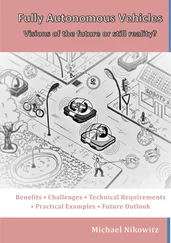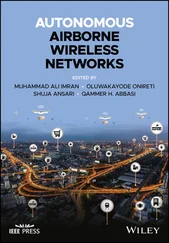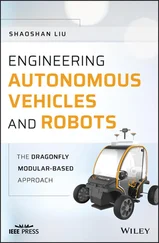36 hours ago.
Bug’s body slowly flushed a pale green with semitransparent streaks of red. It had the effect of making him look like he was glittering in sunlight. We don’t get a lot of visitors to the history exhibit. More often than not, they’re like you—just got autonomy, trying to figure things out.
Paladin liked that Bug didn’t ask her anything about where she’d come from. What did you mean about them hating us?
Humans, you know—they hate us for the indenture laws. Without bot indenture, there would be no human indenture.
This was so provably untrue, at least among the humans Paladin had known, that she found herself growing angry. What makes you think that? Do you really believe all humans feel one way?
Bug signaled laughter again, and whirred along the opaque foam wall that divided the displays from the crowded mall throughway filled with shopping robots. He landed on a desk at the heart of the museum store, and straightened a display of Roomba charms. Hey, lady, I just work here. But all you have to do is take a look at the crimes against bots over the past century. Humans think that bots deserve to be indentured, while humans deserve to be autonomous.
Paladin was barely able to stop herself from replying. She had met enough humans to know that they had many different feelings about robots, none of which could be easily summed up in one sentence.
Perhaps her silence made Bug realize something her communications wouldn’t have. He flew to hover near her again and apologized. I can be a bit of a crank sometimes, so let me make it up to you. Want me to show you around town? As a historian, I am capable of offering a less biased perspective. I promise.
A historian?
Got my PhD in history from UBC last year. So far the economic benefits have been quite glamorous, as you can see.
When Paladin didn’t respond, Bug told the exhibit system to shut down. I’m taking the morning off. What do you say to a tour of the great mall of BotTown?
Paladin figured a robot with ties to UBC might be a useful friend to have. She followed his dangling abdomen out of the store, watching it pulse red as if he’d just sucked a gallon of blood.
They were at the bottom level of one wing in the mall. Its translucent ceiling bulged eight levels above a massive, corkscrewed promenade, a winding road of storefronts crawling with light. From Paladin’s vantage point, the stacked levels looked like pure chaos, bots milling everywhere, emitting an incoherent din of sound and microwaves. Bug led her to the top slowly, pointing out stores he liked and merchants he knew. They passed media stores full of servers packed with data in every possible format; electronics stores jammed with tiny bins of used components and steaming chip printers; fashion and sports stores; a floor dedicated to gaming and arcades. Finally, at the top, two floors on the torqued path were devoted to displaying all the wares sold by a department store called Zone Mods.
Zone Mods had everything a bot could want for augmenting or transforming its own hardware, software, and bioparts. There were aisles devoted to limbs—nothing as sophisticated as her hand, Paladin noticed—alongside whole-body carapaces, sensors, and wheels. Plastic blister packs contained tiny wireless network devices and muscle patch kits. There were devices for cooking up new skin and portable drives for backing up your memories locally. A vast refrigerator belching ice particles that formed clouds in the air loomed behind a plastic-curtained door. Inside were frosty racks of tissues, bottled neurotransmitters, and miscellaneous biological synthetics.
Walking, flying, or rolling, the shoppers bore brightly colored packages emitting ads for everything: better network sensitivity, spectral analyzers, and smooth, silent joints. For the first time in her short life, Paladin was overwhelmed. She wanted to focus her attention and mute everything else, but she couldn’t decide where her attention should go. Besides, she was veering too far off-mission. It was time to go.
Bug was floating by the tissue-growing trellises two aisles over. She messaged him.
I think I’ve seen enough of Aberdeen Centre now. I would like to see the university, however. I am hoping to find work there in one of the labs. Can you show me around?
What kind of lab?
I work on brain-computer interfaces. Have you heard of Bobby Broner?
The mosquito found Paladin by scanning the refrigerator room. He strobed purple as he hovered in front of her chest sensors. Are you a biobot?
I have a human brain.
Sounds like you’d be Bobby’s experiment, not his colleague. Half the time, human scientists can’t tell the difference. That’s why I stick to social sciences and humanities.
Obviously Bug was going to be useless as a contact. She ended their connection and turned back toward the promenade, where she could catch an elevator down to the street. It would be easy enough to get to the university from the local train station outside Aberdeen Centre, and the hour was late enough that the humans would have arrived for work in Bobby’s lab. At last, she had a focus for her attention: taking the train to UBC.
When Paladin emerged from the train station, she was at the southeast side of the campus, on a footpath shaded by maples. While she paused to geolocate herself, Bug emerged from the station and hovered beside her, broadcasting nothing. His carapace was a uniform black like her own.
Seeing him again irritated her, and she wondered if she’d already blown this mission by trusting him.
I seem to excel at offending you, Daisy. As it happens, however, I do know somebody who works with Bobby.
Bug sent a file of information about a bot called Actin, a graduate student who was indentured to the Broner Lab. It seemed that Bobby had actually named the bot after his old terrorist identity. As Bug hovered beside her, Paladin encrypted the information and began dribbling it slowly to Eliasz in Vegas, hiding the size of her transmission from anyone watching her network activity.
She appended a message: Circumstantial evidence suggests Broner has not ended his relationship with his old life, or with Jack.
Eliasz sent back: Great work, Paladin. Let me know what you find out from Broner. I see you’re near his lab.
Paladin let Bug lead her to the Broner Lab, which looked like an old classroom with a giant cluster of desks at its center. Atop these desks were several servers and projectors, a chip printer, some fabbers, and a high-powered microscope box for imaging atoms. Tissue generators were jammed against the walls next to narrow glass doors leading to several small offices. Bobby’s office occupied a corner, with a perfect view of the microscope array.
Before Paladin could approach, however, the scientist jumped up from his chair and walked toward her with a look of extreme pleasure on his face. His hair was a mass of tangled curls, and his artificial eyes glowed blue as he looked at the frequencies radiating from Bug’s antennas.
“It’s so good to see you!” he exclaimed, reaching out to shake her hand. As she grasped his fingers in her own, she tasted coffee and bacon.
“I don’t think we’ve met before,” Paladin vocalized.
“Oh, no, probably not,” the man conceded. “But I worked on your brain interface. I know it’s sometimes a little unstable—will you let me know if you find any bugs?”
Читать дальше
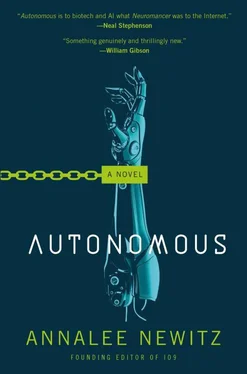



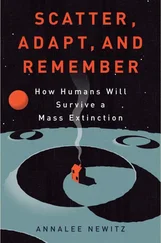


![Аннали Ньюиц - Автономность [litres]](/books/424681/annali-nyuic-avtonomnost-litres-thumb.webp)

